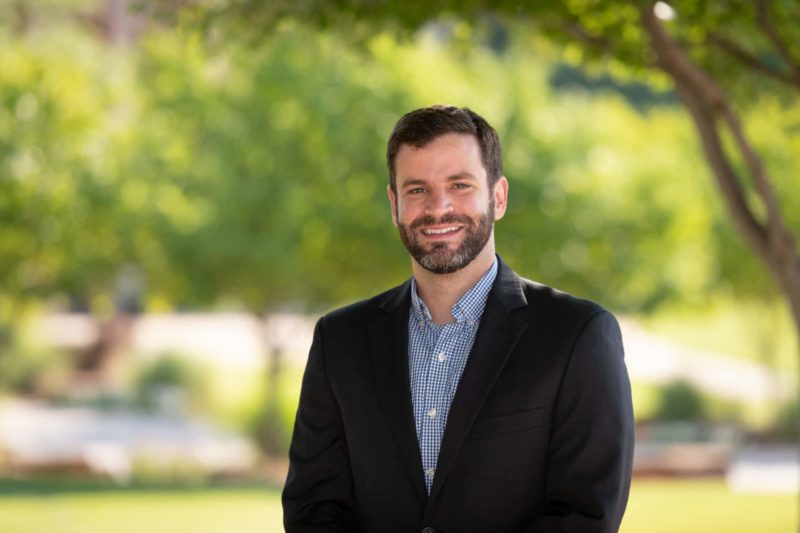
Becoming a physician was always the long-term plan of Adam Bertroche, D.O.’17. After graduating from Luther College in Decorah, IA, with a bachelor of science degree in biology and working for a year for a medical electronic records company, he enrolled at DMU.
“I really enjoyed how DMU exposes students to a lot of different experiences, such as in osteopathic manual medicine, the surgical labs and the simulation center,” he says. “For my rotations, instead of being at one site, I was able to get more experiences in a lot of different settings.”
While he considered family medicine, emergency medicine and neurology for his career, he chose psychiatry because of its impact on patients that he observed.
“Even for patients with a high degree of functional impairment, it’s incredible to see the kind of improvement they have with the psychiatric interventions we provide,” he says.
Dr. Bertroche will have a prominent role in that treatment as the psychiatrist at DMU’s new Behavioral Health Clinic, which will begin seeing patients this winter. The center will be part of the multi-specialty DMU Clinic at 3200 Grand Ave. in Des Moines. “It’s an exciting opportunity to be part of that,” he says.
The University will hire additional staff and providers for the new Behavioral Health Clinic in the coming months; a grand opening/ribbon-cutting event will take place in December.
William Davis, a 1985 DMU graduate and a retired psychiatrist, has been serving as a consultant in planning and opening the clinic. Certified in child, adolescent and adult psychiatry, he served patients for more than 30 years, primarily in Minneapolis, at his private office-based practice and as medical director of two psychiatric units affiliated with M Health Fairview University of Minnesota Medical Center. Given the “tremendous need” for mental health care services, he is frequently asked by practices for advice and readily responded to DMU’s request for guidance.
“Working to develop the clinical program really appealed to me,” Dr. Davis says. “It’s important that we make this a really good experience for providers, residents and students so that we can encourage them to go into psychiatry. It requires an interdisciplinary team approach that engages everyone who is involved with the patient.”
The addition of the behavioral health service to Des Moines University Clinic is the next step in actualizing a multi-phase plan with a vision to help address the behavioral health crisis in Iowa and across the country. The first two phases were to pilot and then fully deliver to the University’s osteopathic medical students, beginning in 2018, the provider education program of the National Alliance on Mental Health (NAMI), the nation’s leading advocacy group for mental illness. DMU was the nation’s first medical school to partner with NAMI to require students to complete the program. All medical schools train students how to diagnose mental illness, but the NAMI program prepares D.O. students, regardless of the specialty they pursue, to recognize mental illness among their patients and then treat them or refer them to appropriate caregivers.
DMU has received funding for the program from the Polk County Board of Supervisors, the Legacy Grant Program of Prairie Meadows Racetrack and Casino, and the state of Iowa. A 2020 study by investigators at DMU and NAMI showed that the provider education program can improve the way medical students perceive and treat patients with severe mental illness, helping reduce the stigma these individuals face in health care.
The University’s vision for responding to the nation’s need for mental health care will culminate with efforts to develop its workforce with the new clinic by serving as a training ground for medical students, psychiatry residents and other behavioral health professionals. A report published in 2020 by the Health Resources and Services Administration (HRSA) identified a scarcity of behavioral health professionals as the primary barrier to meeting the national demand for mental health services. In the United States, one in five people have some form of psychological disorder. But the rising demand for psychiatrists has not been met by a corresponding increase in the specialty’s workforce.
As of September 2020, there were 30,451 practicing psychiatrists in the field – nine physicians per 100,000 people with a workforce deficit of 6.4 percent. While that may not seem too substandard, providers and treatment options are highly uneven. More than 60 percent of all U.S. counties have no practicing psychiatrists. Rural and other underserved areas are particularly hard hit. By 2025, the workforce deficit is projected to escalate to 25 percent.
“There is more awareness about mental health, and people are more willing to seek help, but the need for providers is great,” says Dr. Bertroche.
He completed a four-year psychiatry residency at the University of Kansas School of Medicine (KUMC), where he received an Excellence in Scholarship Award. In his last year there, he was chief psychiatry resident at the Kansas City Veterans Hospital, a role in which he served as a junior attending and oversaw all KUMC psychiatry residents working there. He also created a guide for medical students and residents on completing the Veterans Administration system’s Comprehensive Suicide Risk Evaluation as well as a learning tool for students and residents to understand differential diagnoses for the most common psychiatric issues patients present.

